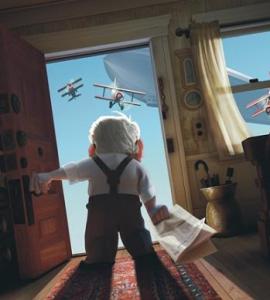
Carl Fredricksen under attack by explorer Charles Muntz
Since the release of the Incredibles in 2004, Pixar has proven that it can run with grown-ups as well as the kindergarten crowd. Kid movies, after all, will always have multiple audiences. The trick is to produce stories that cohere as well as engage these different movie-goers. The Batman and Bugs Bunny of my youth did this by packing episodes with jokes, allusions, and celebrity guest stars geared to my parents. No matter, the shows had enough fights, cliff-falls, and shotgun-blasts to keep me watching.

Pixar’s strategy, however, has been more ambitious: to produce films that pull in adults by compelling stories rather than sophisticated jokes.
The Incredibles (2004), for example, broke with a tradition of scripting superhero movies as bildungsroman, coming-of-age stories for teens with mutant powers. Instead it told the story of superheroes as they are getting soft, wrestling with the demands of family life, middle age, and lost ambitions. While there are plenty of explosions and chase sequences, the real action of The Incredibles is in the livingroom, when Bob Parr (Mr Incredible) spars with his wife Helen (Elastigirl) about life’s priorities.

The Incredibles (2004)
Up boasts no superheroes or spandex, but it follows The Incredibles‘ lead by creating a protagonist, Carl Fredricksen (Ed Asner), widower and would-be adventurer, who has seen brighter days. When we meet Carl, he is grieving the loss of his wife Ellie (Ellie Docter). After a court pressures him to sell his house and enter a retirement community, he uses his balloon expertise to turn his Victorian house into a helium dirigible, sailing aloft and out of reach of contractors and nursing home attendants.

He decides to steer his craft south, towards the mythic South American land of Paradise Falls, a place he dreamed of visiting with Ellie since they formed an adventure club as kids. Only after lifting off does Carl realize that he has a passenger, Russell (Jordan Nagai), a Wilderness Explorer trying to earn an “Assisting the Elderly” merit badge.

Russell
What inspires me to write about Up here? Because the film is about exploration in the many senses of the word. From its opening shot, Up creates a backstory for Paradise Falls, a lost world which was explored by wealthy adventurer Charles Muntz (Christopher Plumber) in his dirigible, The Spirit of Adventure. Muntz returns claiming discovery of a large flightless bird, meeting with ridicule. With no proof of his discovery, he is stripped of his membership in the National Explorer’s Club, and leaves on The Spirit of Adventure (with a large pack of dogs) vowing to return once he has proven his claim to the world.

Charles Muntz, explorer of Paradise Falls
Muntz’s exploration of South America borrows much from Arthur Conan Doyle’s 1912 book, The Lost World, which also tells the story of a South American expedition (led by Dr. Challenger) who is ridiculed for claiming the discovery of living dinosaurs.

Yet as a wealthy explorer with a keen sense of technology, Muntz also resembles Howard Hughes, piloting the H-4 Hercules (Spruce Goose) in 1947, and Walter Wellman, who steered the dirigible America toward the North Pole in 1906. He also reminds me of Frederick Cook, whose claims of discovering the North Pole in 1909 eventually brought about public ridicule and expulsion from the Explorers Club the following year. (As for Muntz’s dogs, trained to perform human tasks and provided the power of speech, I couldn’t help but think of The Island of Dr. Moreau by H. G. Wells).

Walter Wellman aboard America
As for the giant flightless bird of Paradise Falls (named “Kevin” by Russell), it could be an allusion to Doyle’s dinosaur, but it also made me of the most famous description of a South American flightless bird, Charles Darwin’s discovery of the Rhea in 1833, a find that had serious implications for his theory of evolution.

Kevin, flightless bird of Paradise Falls

Rhea Darwinii
More compelling than these historical and literary allusions, however, are the deeper questions Up raises about the idea of exploration. As children, Carl and Ellie bonded over the idea of exploring Paradise Falls, a dream that was never realized during Ellie’s lifetime. It fuels Carl’s quest to reach the mythic locale after her death. Yet once he reaches the Falls, Carl opens up Ellie’s childhood “My Adventures” scrapbook to find that the pages after “Paradise Falls” are not empty, but filled with pictures of Carl and Ellie through the happy years of their marriage. Adventure – Ellie knows – is where you find it, and discovery, as William Goetzmann points out in Exploration and Empire, is almost always a question of re-discovery, finding new things in places already traveled.

Ellie and Carl
Most of all, Carl’s insight into the idea of adventure reminded me of Philip Carey, protagonist of Somerset Maughm’s novel Of Human Bondage (1915). Although Carey nurtured a lifelong dream to travel, he eventually decides to shelve this plan when he falls in love, seeing a different path to discovery:
What did he care for Spain and its cities, Cordova, Toledo, Leon; what to him were the pagodas of Burmah and the lagoons of the South Sea Islands?…He had lived always in the future, and the present always, always had slipped through his fingers. His ideals? He thought of his desire to make a design, intricate and beautiful, out of the myriad, meaningless facts of life: had he not seen also that the simplest pattern, that in which a man was born, worked, married, had children, and died, was likewise the most perfect?
Charles Muntz is the most traveled character of Up. He is also the least enlightened by his travels, scarcely touched by his experiences of Paradise Falls except for his obsessive quest with finding the flightless bird. Ellie, by contrast, never leaves the suburbs and the zoo where she works. But she understands that exploration is a state of mind as much as a plan of action, an experience that does not require talking dogs or dirigibles.












It’s a wonderful life
😉